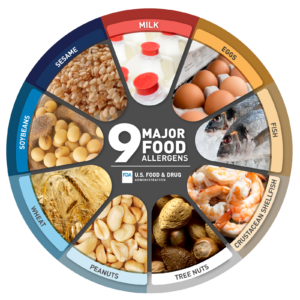Food Allergies and Dietary Restrictions
Food allergies and dietary restrictions have become increasingly prevalent in recent years, with millions of people worldwide affected by these conditions. As a result, the food and beverage industry has been forced to adapt to meet the needs of this growing demographic. In this article, we will explore the impact of food allergies and dietary restrictions on the food and beverage industry, and how businesses are responding to these challenges.
The Rise of Food Allergies and Dietary Restrictions
According to the World Allergy Organization, food allergies affect between 220 and 250 million people worldwide. In the United States alone, it is estimated that 32 million Americans have food allergies, with peanut, tree nut, milk, egg, soy, wheat, fish, and shellfish being the most common allergens.

Dietary restrictions are also on the rise, with many people choosing to follow diets such as veganism, vegetarianism, and gluten-free diets for various reasons, including health concerns and ethical beliefs.
The Impact on the Food and Beverage Industry
Food allergies and dietary restrictions have had a significant impact on the food and beverage industry. Businesses have had to adapt their menus and products to meet the needs of customers with food allergies and dietary restrictions. Failure to do so can result in lost revenue and damage to a company’s reputation.
In recent years, many restaurants and food establishments have implemented procedures to ensure that their food is safe for people with food allergies. These procedures may include separate preparation areas, ingredient labeling, and staff training on food allergies.
The rise of dietary restrictions has also led to an increase in demand for specialized products. Many companies have responded to this demand by developing new products or adapting existing ones to meet the needs of customers with dietary restrictions. For example, plant-based milk alternatives have become increasingly popular, with sales of almond milk alone growing by 250% in the United States between 2011 and 2016.
Challenges Faced by the Food and Beverage Industry
Despite efforts to accommodate customers with food allergies and dietary restrictions, the food and beverage industry faces several challenges.
One of the biggest challenges is the potential for cross-contamination. Even a small amount of an allergen can cause a severe allergic reaction, so businesses must take measures to prevent cross-contamination between different ingredients.
Another challenge is the cost of specialized products. Many products designed for people with dietary restrictions are more expensive than their conventional counterparts, which can make them less accessible to some customers.
Additionally, there is a risk of “allergy faking,” where customers claim to have a food allergy or dietary restriction to get special treatment or attention. This can be frustrating for businesses who are genuinely trying to accommodate customers with food allergies and dietary restrictions.
Responding to the Challenges
To address these challenges, the food and beverage industry has taken several steps to ensure the safety of customers with food allergies and dietary restrictions.
One approach is to implement strict protocols for food preparation and handling. This may include having separate preparation areas for allergen-free foods, using separate cooking utensils and equipment, and thoroughly cleaning and sanitizing all surfaces between uses.

Another approach is to provide training to staff on food allergies and dietary restrictions. This can help employees to identify potential allergens and take appropriate steps to prevent cross-contamination. Staff can also be trained to handle situations where customers claim to have a food allergy or dietary restriction, such as asking for additional information or offering alternative options.
Some companies have also developed specialized products that are more affordable and accessible for customers with dietary restrictions. For example, a company may offer a gluten-free product that is priced similarly to its conventional counterpart, making it accessible to customers who may not be able to afford more expensive specialized products.
While there are still challenges to be addressed, such as the risk of cross-contamination and the cost of specialized products, the food and beverage industry has made great strides in accommodating customers with food allergies and dietary restrictions.
As the number of people with these conditions continues to grow, it is likely that the food and beverage industry will continue to adapt and evolve to meet their needs. With advances in technology and increased awareness of these conditions, the future looks bright for customers with food allergies and dietary restrictions who are looking for safe and delicious food options.
Furthermore, the impact of food allergies and dietary restrictions goes beyond just the food and beverage industry. It also affects food labelling laws and regulations, which are in place to protect consumers from allergens and potential harm. In many countries, including the United States, Canada, and the European Union, food manufacturers are required to list major food allergens on their products’ labels.
Food labelling laws have been crucial in helping people with food allergies avoid potentially dangerous foods. However, the effectiveness of these laws relies on accurate labelling and transparency from food manufacturers. In recent years, there have been concerns about food manufacturers mislabelling their products or not disclosing all of the ingredients used in their products.
To address this issue, some countries have introduced stricter regulations for food labelling, such as requiring food manufacturers to disclose all potential allergens in their products. Additionally, many consumers are now turning to third-party certifications, such as the Certified Gluten-Free or Kosher symbols, to ensure that their food is safe for their specific dietary needs.
In conclusion, the impact of food allergies and dietary restrictions on the food and beverage industry is significant and continues to evolve. While there are still challenges to be addressed, such as the risk of cross-contamination and the cost of specialized products, the industry has made great strides in accommodating customers with these conditions.
As the number of people affected by food allergies and dietary restrictions continues to grow, it is important for the food and beverage industry to continue to adapt and evolve. By providing safe and delicious food options, implementing strict protocols for food preparation and handling, and offering specialized products, businesses can ensure that all customers feel welcomed and catered to. Additionally, stronger food labeling laws and regulations can help protect consumers from allergens and potential harm.
Overall, the impact of food allergies and dietary restrictions on the food and beverage industry has highlighted the importance of accessibility, transparency, and inclusivity in the food industry. It is up to businesses, policymakers, and consumers alike to continue to work towards a safer and more accommodating food industry for all.



